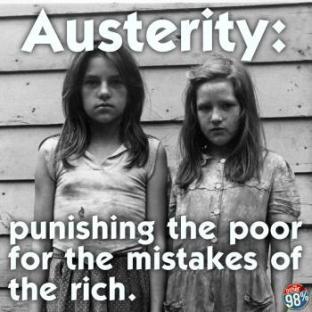From Lars Syll It’s hard not to agree with DeMartino’s critique of mainstream economics — an unethical, irresponsible, and harmful kind of science where models and procedures become ends in themselves, without consideration of their lack of explanatory value as regards real-world phenomena. Many mainstream economists working in the field of economic theory think that their task is to give us analytical truths. That is great — from a mathematical and formal logical point of view. In science, however, it is rather uninteresting and totally uninformative! The framework of the analysis is too narrow. Even if economic theory gives us ‘logical’ truths, that is not what we are looking for as scientists. We are interested in finding truths that give us new information and knowledge of the
Topics:
Editor considers the following as important: Uncategorized
This could be interesting, too:
tom writes The Ukraine war and Europe’s deepening march of folly
Stavros Mavroudeas writes CfP of Marxist Macroeconomic Modelling workgroup – 18th WAPE Forum, Istanbul August 6-8, 2025
Lars Pålsson Syll writes The pretence-of-knowledge syndrome
Dean Baker writes Crypto and Donald Trump’s strategic baseball card reserve
from Lars Syll
It’s hard not to agree with DeMartino’s critique of mainstream economics — an unethical, irresponsible, and harmful kind of science where models and procedures become ends in themselves, without consideration of their lack of explanatory value as regards real-world phenomena.
Many mainstream economists working in the field of economic theory think that their task is to give us analytical truths. That is great — from a mathematical and formal logical point of view. In science, however, it is rather uninteresting and totally uninformative! The framework of the analysis is too narrow. Even if economic theory gives us ‘logical’ truths, that is not what we are looking for as scientists. We are interested in finding truths that give us new information and knowledge of the world in which we live.
Scientific theories are theories that ‘refer’ to the real world, where axioms and definitions do not take us very far. To be of interest to an economist or social scientist who wants to understand, explain, or predict real-world phenomena, the pure theory has to be ‘interpreted’ — it has to be an ‘applied’ theory. An economic theory that does not go beyond proving theorems and conditional ‘if-then’ statements — and does not make assertions and put forward hypotheses about real-world individuals and institutions — is of little consequence for anyone wanting to use theories to better understand, explain or predict real-world phenomena.
Building theories and models on unjustified patently ridiculous assumptions we know people never conform to, does not deliver real science. Real and reasonable people have no reason to believe in ‘as-if’ models of ‘rational’ robot imitations acting and deciding in a Walt Disney world characterised by ‘common knowledge,’ ‘full information,’ ‘rational expectations,’ zero transaction costs, given stochastic probability distributions, risk-reduced genuine uncertainty, and other laughable nonsense assumptions of the same ilk. Science fiction is not science.
 For decades now, economics students have been complaining about the way economics is taught. Their complaints are justified. Force-feeding young and open-minded people with unverified and useless mainstream economic theories and models cannot be the right way to develop a relevant and realistic economic science.
For decades now, economics students have been complaining about the way economics is taught. Their complaints are justified. Force-feeding young and open-minded people with unverified and useless mainstream economic theories and models cannot be the right way to develop a relevant and realistic economic science.
Most work done in mainstream theoretical economics is devoid of any explanatory interest. And not only that. Seen from a strictly scientific point of view, it has no value at all. It is a waste of time. And as so many have been experiencing in modern times of austerity policies and market fundamentalism — a very harmful waste of time.
